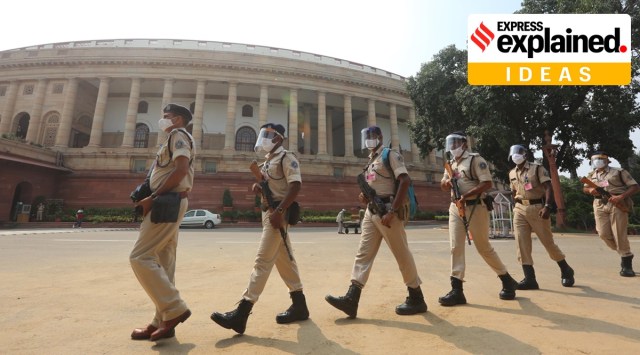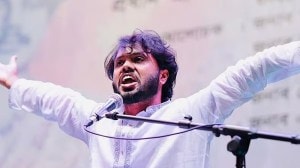Explained Ideas: How the Modi govt has been bypassing Parliament
The Lok Sabha and the Rajya Sabha are ceasing to be places for debates, write Christophe Jaffrelot and Vihang Jumle.
 CRPF personnel wearing face coverings at the Parliament House in New Delhi in September 2020. (Express Photo: Prem Nath Pandey)
CRPF personnel wearing face coverings at the Parliament House in New Delhi in September 2020. (Express Photo: Prem Nath Pandey)In their joint opinion piece in The Indian Express, Christophe Jaffrelot of CERI- Sciences Po/CNRS, Paris and Vihang Jumle of the King’s India Institute write about Modi government’s record of bypassing Parliament.
On average, he has spoken 3.6 times a year in Parliament: 22 times in six years (not more than H D Deve Gowda who was PM for two years). In contrast, Atal Bihari Vajpayee spoke 77 times in six years when he was Prime Minister and Manmohan Singh spoke 48 times in Parliament during his 10 years in office.
These statistical data illustrate the populist style of communication of Modi, who prefers to communicate directly with the people, either on the radio (like Indira Gandhi in the 1970s) or via social media (like the US President Donald Trump).
📣 Follow Express Explained on Telegram
According to the two authors, these two methods have one thing in common: They reflect a preference for one-way messaging, which obviates the risk of contradiction, and questioning by the receiver.
By definition, Parliament is the crucible of criticism, deliberation and even consensus-making. Parliamentarism stands poles apart from populism, not only because it epitomises representative democracy (in contrast to the direct contact of the leader with “his” people), but also because it treats opponents as adversaries, not as enemies.
In order to circumvent Parliament, the Modi government has often followed the ordinance route. While ordinances are usually resorted to by minority governments or coalition governments, the Modi government has used it more than any of his predecessors despite the BJP enjoying a majority in the Lok Sabha. The average number of ordinances jumped from six a year under Manmohan Singh to 11 a year under Modi.
Also read | Explained Ideas: Why Atmanirbhar Bharat will not work for India
Clearly, the Lok Sabha and the Rajya Sabha are ceasing to be places for debates.
First, the number of Bills that have been referred to parliamentary committees — the deliberative core of parliamentary work — has shrunk dramatically, from 68 (71 per cent of the total) in the 15th Lok Sabha to 24 (25 per cent of the total) in the 16th Lok Sabha — and zero in 2020!
Second, several key pieces of legislation have been passed as Money Bills, despite the fact that they did not fit this category.
Third, ordinary Bills are not so much discussed, either because their texts are handed over to the MPs at the last minute or because there is little time for debates.
“The decline of Parliament is for everyone to see. But does anyone care?” they ask.
- 01
- 02
- 03
- 04
- 05






































